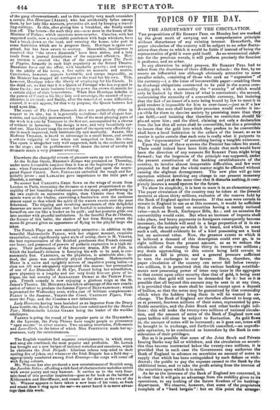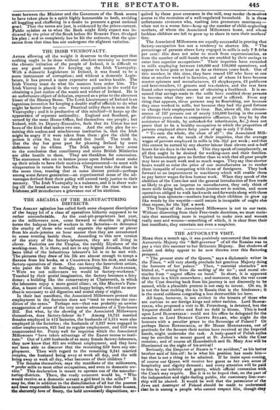TOPICS OF THE DAY.
THE ADJUSTMENT OF THE CIRCULATION.
THE propositions of Sir ROBERT PEEL on Monday last are marked by the great merit of carrying out a comprehensive principle without disturbance of any existing interest. Henceforth, the paper circulation of the country will be subject to no other fluctu- ations than those to which it would be liable if instead of being the representative of gold it were gold itself. As an economical substi- tute for the precious metals, it will perform precisely the function it professes, and no other. In any alteration he might propose. Sir ROBERT PEEL had to select from the doctrines of three different schools : the first, by no means an influential one although obviously attractive to some peculiar minds, consisting of those who seek an "expansion" of the currency—i. e. the issue of inconvertible paper—enabling them to discharge obligations contracted to be paid in the scarce com- modity gold, with a commodity the " scarcity " of which would only be limited by their ideas of what is convenient ; the second, maintaining the necessity of a convertible currency, but insisting that the fact of an issuer of a note being bound by law to meet it in gold renders it impossible for him to over-issue,—just as if a law - decreeing that men shall keep their promises would render it int- } o;sible for them to deceive society by promising more than the), t an fulfil,—and insisting that therefore no restriction shouter:be" plated upon him ; and the third, claiming not only a declaratiOn from the law that all notes shall be convertible, but also a provision to insure that the gold into which they profess to be convertible shall have a local habitation in the cellars of the issuer, so as to render it quite certain that each note is really what it purports to be, the "representative" of something having a tangible existence. Upon the last of these systems the Premier has taken his stand. There could indeed have been little doubt that such would have been the direction of any measure Sir ROBERT PEEL might bripg forward ; but the largeness of the principle was supposed, under the present constitution of the banking establishments of the country, to involve almost insuperable difficulties and few were prepared to find that the whole matter might be effected without' causing the slightest derangement. The new plan will go into operation without Involving any change in our present monetary' relations; and yet at she same time that it disturbs nothing, It com- pletely insures a sound ystem for the future. To show its simplicity, it is best to state it in an elementary way. The paper circulation of the country may be taken at the Present moment at about thirty millions, exclusive of the reserve held by the Bank of England against deposits. If that sum were certain to remain in England in use as at this moment, it would be sufficient that it should be based on securities having a merely national value—such as Stock, Exchequer Bills, &c.; and no occasion for convertibility would exist. But when an increase of imports shall take place, and heavy payments to foreigners consequently become necessary, the holders will send in a large proportion of it in ex. change for the security on which it is based, and which, to meet such a call, should evidently be of a kind possessing not a local but an universal value. Now, the greatest extent to which it- is believed a demand of this description could ever go, is to eight millions from the present amount, so as to reduce the
circulation of the country from thirty to twenty-two ; any drain approaching to this extent being held certain to produce a fall in prices, and a general pressure sufficient to turn the exchanges in our favour. Since, therefore, the paper circulation of the country can never fall below twenty- two millions, it is permitted that the various banking establish- ments now possessing power of issue may issue in the aggregate to that extent upon other security than that of gold, it being next to certain that gold will never be demanded for it: but as it is possible that all beyond this amount may be sent in at any time, it is provided that no more shall be issued except upon a deposit of bullion, so that the notes may be guaranteed by that commodity which when the holders bring them in will be wanted in ex- change. The Bank of England are therefore allowed to keep out, as at present, fourteen millions of their notes, represented by pro- fitable securities, and the Joint Stock and other banks eight mil-, lions : this will make the twenty-two millions of national circula- tion, and the amount of notes of the Bank of England now out upon bullion will alone be subject to fluctuation. As gold flows in, the amount of notes will be increased ; as it goes out, notes will be brought in in exchange, and forthwith cancelled,—an unprofit- able operation, to be conducted as heretofore by the Bank in con- sideration of their privileges.
But as it is possible that some of the Joint Stock and Private Issuing Banks may fail or withdraw, and the circulation on securi- ties thus become contracted below the twenty-two millions, it is provided that in such case the Government may authorize the Bank of England to advance on securities an amount of notes to supply that which has been extinguished by such failure or with- drawal; the public to pay the expense caused to the Bank by the additional issue, and to take the profit arising from the interest of the securities upon which it is made.
As far as the interests of the Bank of England are concerned, it is clear that it will gain an advantage from the stability given to its operations, to say nothing of the future freedom of its banking department. We observe, however, that some of the proprietors Complain of a "hard bargain" : but on this point the arrause.;: rnent between the Minister and the Governors of the Bank seems to have taken place in a spirit highly honourable to both, avoiding all haggling and chaffering in a desire to promote a great national Rota That the terms are just, is evidenced by the prices-current. Public opinion as to what the Bank might fairly expect was in- dicated by the price of the Stock before Sir ROBERT PEEL divulged his plan ; and so completely has he hit the estimate, that the quo- tation from that time has not undergone the slightest variation.



























 Previous page
Previous page